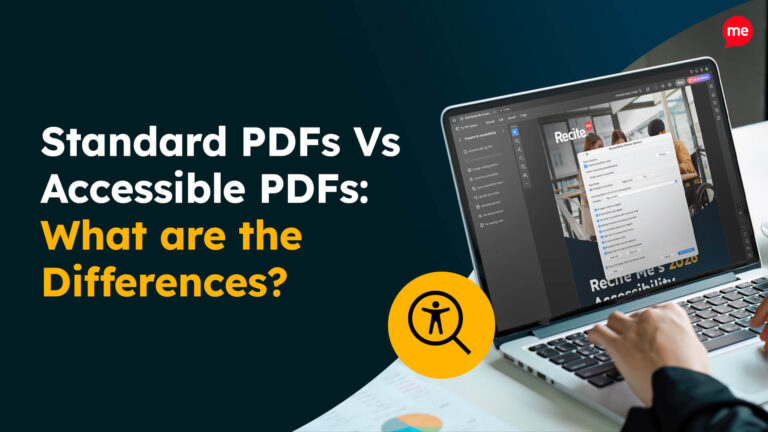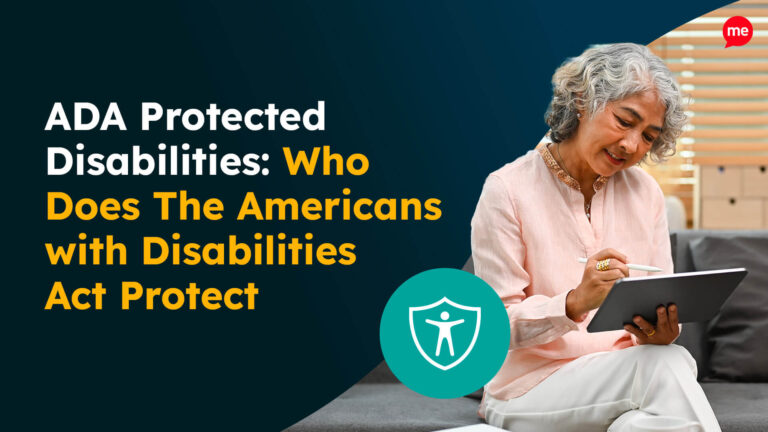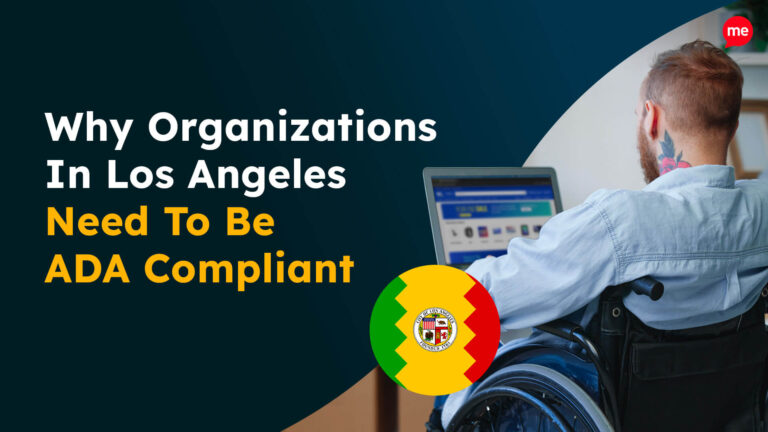Get A Free ADA Compliance Audit Of Your Website
Download NowDid you know that the average US internet user spends a staggering 400 minutes online every day? That’s nearly seven hours!
Whether it’s banking, shopping, booking leisure and entertainment activities, or accessing learning resources and communication forums, online platforms make light work of tasks that would once have required a trip to a brick-and-mortar store. However, unless websites are accessible, that’s not true for individuals with disabilities.
Imagine navigating a world where clicking a button isn’t just an action but a challenge, and filling in simple forms becomes an insurmountable task. Recognizing this as a reality for many residents, The Show-Me State has taken additional strides to bridge the digital divide.
Here’s everything you need to know about web accessibility legislation in Missouri.
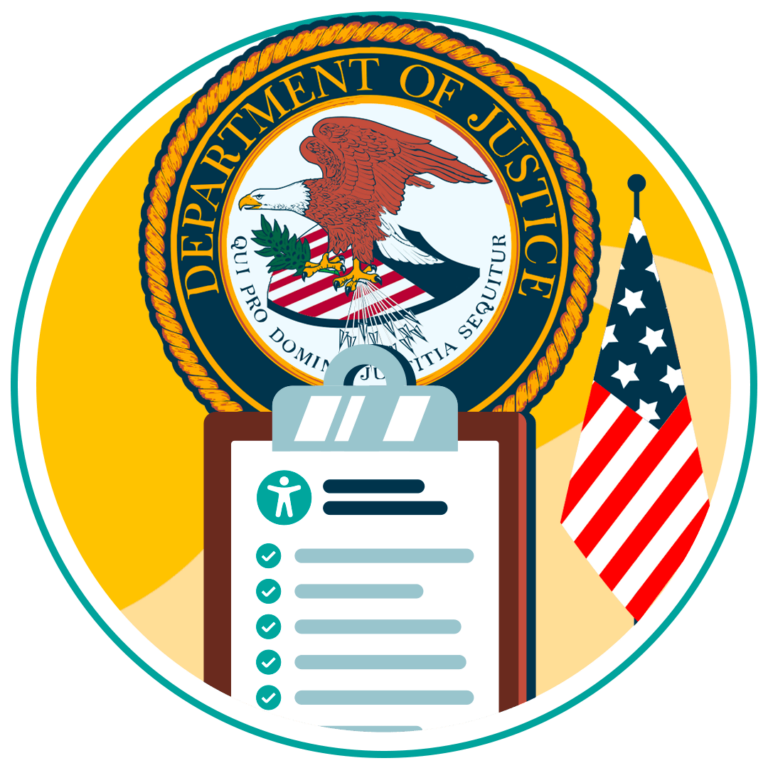
Web Accessibility Laws in Missouri
Comprehensive digital accessibility laws already exist at the federal level. However, Missouri is one of the many forward-thinking states to have enacted stand-alone web accessibility legislation for its one in every four residents with disabilities.
Let’s start with an overview of the federal legislature before exploring Missouri’s state web accessibility standards.
The Americans With Disabilities Act (ADA)
Initially enacted in 1990 to combat discrimination against individuals with physical disabilities, The Americans with Disabilities Act (ADA) now extends its purview to encompass the digital realm. By extending the principles of inclusivity into the digital sphere, the ADA reinforces its commitment to equality, empowering individuals with disabilities to navigate online spaces with dignity and autonomy.
Among the ADA’s five titles, three hold particular relevance to digital accessibility:
- ADA Title I: Fair Employment – Title I mandates equal access to employment opportunities and related information for federal employees with disabilities.
- ADA Title II: Public Services and Programs – Title II mandates that digital information regarding government services, programs, or activities must be equally accessible to disabled citizens.
- ADA Title III: Public-facing Entities – Title III mandates that any business operating a public-facing website must ensure that goods, services, facilities, and accommodations are accessible to everyone, irrespective of disabilities or limitations.
Section 508
Section 508 of the Rehabilitation Act aims to ensure that individuals with disabilities, both within the federal workforce and among the public, enjoy equitable access to digital resources and services. As such, federal agencies and offices are required to procure, develop, maintain, and utilize electronic and information technology (EIT) that is accessible to all. This encompasses a broad spectrum of digital assets, including websites, software applications, electronic documents, multimedia content, and telecommunications products.
The primary objectives of Section 508 are twofold:
- Equal Access for Federal Employees – Digital infrastructure must facilitate equal access to online resources for employees with disabilities.
- Comparable Access for the Public – Members of the public seeking federal information or services must have equitable access to digital resources.

The Missouri Information Technology Accessibility Standard
Missouri has joined several other states in enacting legislation that mirrors section 508. Essentially acting as a mini 508 for its own state agencies and offices, the Missouri Information Technology Accessibility Standard is based on Web Content Accessibility Guidelines 2.0 (more on WCAG coming up later!) and covers a wide array of EIT, including:
- Websites and web applications
- Multimedia
- Electronic documents
- Training resources
- Social media
Under Missouri state law (RSMo. 161.935), it is the responsibility of the Missouri Technology Council and the Office of Information Technology to ensure and maintain equitable digital accessibility for individuals with disabilities. You can find a breakdown of key terms and goals on the Missouri government’s assistive technology website.
Stay ahead of the game when it comes to Digital Accessibility laws and compliance in the United States. Learn about all the different federal and state-level regulations, see real examples of web accessibility lawsuits in different regions and discover a 7-step action plan for building accessible websites.
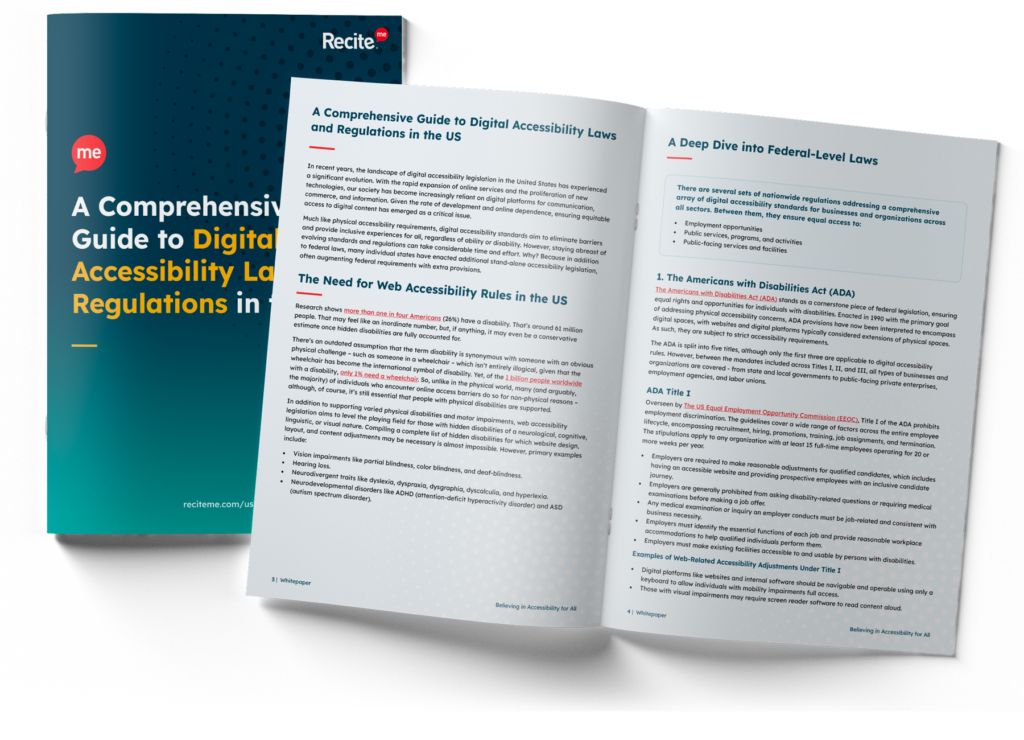
Which Businesses Do Missouri Web Accessibility Laws Apply To?
While the primary focus may be on state offices, branches, and departments, Missouri’s web accessibility legislation also reverberates outside the public sector, encompassing a wide array of private entities. For example, private businesses are expected to comply with Section 508 if they:
- Provide third-party contractors for government agencies.
- Receive grants or funding from government offices.
Furthermore, ADA Title III applies to any business with a public-facing website. This includes, but is by no means limited to:
- Retail companies that sell via online platforms.
- Hospitality businesses offering online reservations.
- Financial institutions providing digital banking services.
- Hospitals, clinics, and medical practices offering online appointment scheduling or telehealth services.
- Schools, colleges, and universities providing online registration and digital course materials.
- Movie theaters, concert halls, and sports arenas with online ticket purchasing options.
- Etc
Consequences of non-compliance
Failure to prioritize web accessibility exposes businesses to significant financial risk. It also jeopardizes brand reputation and long-term viability. Here’s a comprehensive breakdown of potential risks and repercussions:
- Fines – Federal violations (ADA and Section 508) can incur fines starting at $55,000 for the first breach, with subsequent breaches doubling to $110,000.
- Legal action – Non-compliance opens the door to legal action from both private citizens and advocacy groups. The cost of legal fees, court proceedings, and settlement sums can add up to a substantial financial burden.
- Revenue loss – Modern-day consumers are becoming increasingly conscious, so association with poor business practices can lead to a significant drop in market share.
- Reputational damage – Negative publicity stemming from accessibility issues can lead to diminished brand loyalty, reduced market reach, and boycott campaigns.
- In-house unrest – Eroded consumer trust can significantly decrease shareholder confidence and employee morale.
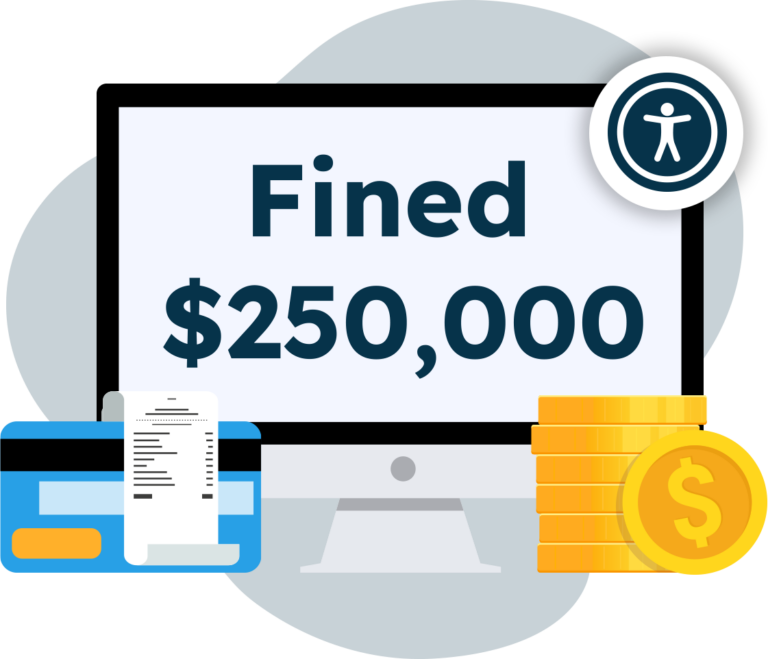
Digital Accessibility Lawsuits in Missouri
In Missouri, as in every other state, digital accessibility lawsuits are on the rise. Furthermore, according to recent statistics, website accessibility lawsuits account for 37% of lawsuits filed in federal court. Currently, Missouri ranks 7th nationwide in terms of the number of cases filed.
It’s essential to remember that under ADA Title III, any company doing online business in Missouri can have a lawsuit filed against them. That means that, aside from state agencies and offices, any of the state’s 500,000+ small businesses could find themselves in legal trouble for non-compliance.
It’s also essential to note that businesses don’t need to have a physical presence or have been formed within the state for Missouri web accessibility laws to apply. As long as a company has a digital presence, it can be taken to court for violations. This is precisely what happened when Tyler Rodick filed a complaint in Missouri against NCS Pearson Inc.
Tyler Rodick vs NCS Pearson Inc
Despite only having operational US offices in Bloomington, MN, and San Antonio, TX, Rodick filed a suit against NCS Pearson Inc. in Missouri. Rodick claimed that the pearsonassessments.com website, which offers testing services, was not sufficiently digitally accessible for individuals with disabilities under ADA Title III.
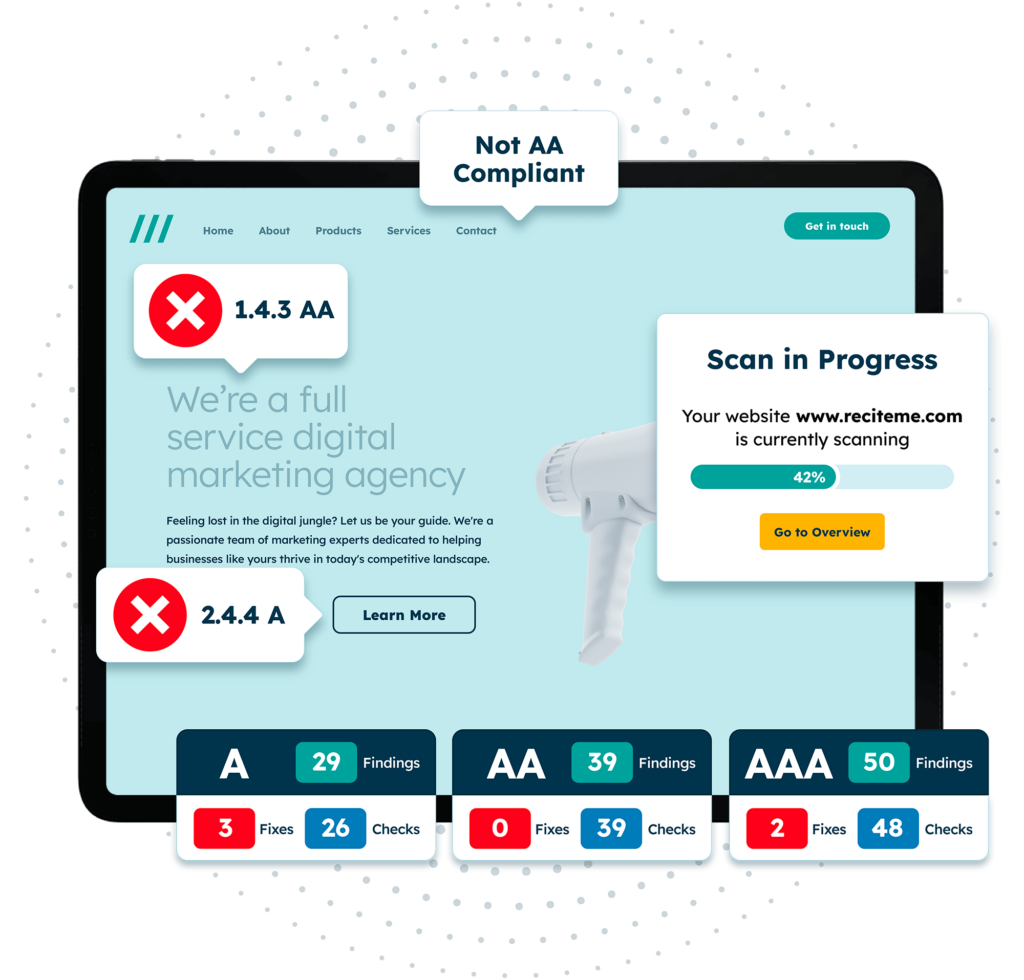
Free Accessibility Check of your Website
Finding accessibility issues is now easier than ever. Recite Me offers a free automated scan of your website’s homepage to highlight non-compliance. You’ll get recommendations on how to fix them, helping to improve your accessibility score.
The Importance of WCAG Compliance
Developed and published by the World Wide Web Consortium (W3C), the Web Content Accessibility Guidelines (WCAG) provide a standardized framework for creating accessible online content. Understanding and adhering to the WCAG is essential, as the guidelines form the backbone of Missouri web accessibility legislation at both state and federal levels. Therefore, compliance ensures legal protection in addition to improved user experiences and expanded market reach.
WCAG criteria revolve around the ‘POUR’ principles, which provide guidance on how to make online content suitably:
- Perceivable – Information must be presented in ways that users can perceive, encompassing various sensory modalities.
- Operable – Interface components and navigation must be operable by all users and assistive technologies.
- Understandable – Content must be organized logically, using clear language and navigation structures to facilitate comprehension.
- Robust – Reliable content interpretation should be possible using a wide range of user agents, including screen readers.
The guidelines are organized into three conformance levels:
- A – Basic
- AA – Industry Standard
- AAA – Advanced
Current Missouri web accessibility legislation requires compliance with WCAG 2.0 Level AA. However, as 75% of all federal claims reference the most up-to-date version, WCAG 2.1AA, enhanced compliance is recommended.
How to Make Your Website Compliant with Missouri Web Accessibility Laws
Ensuring compliance with Missouri’s web accessibility laws isn’t just a legal obligation. It’s a commitment to promoting digital equity and providing enhanced user experiences for all website visitors.
By leveraging Recite Me’s suite of accessibility-on-demand tools, organizations can navigate compliance with confidence while prioritizing inclusivity and usability for individual users. Here are the steps to follow to get started.
1. Assess Your Website’s Current State
Utilize the Recite Me Accessibility Checker to conduct a comprehensive audit of your website’s accessibility. Our accessibility software runs 396 separate scans aligned with WCAG criteria, identifying non-compliance issues and generating a prioritized fix queue for effective resolution.
Schedule a free demonstration or run a free scan today!
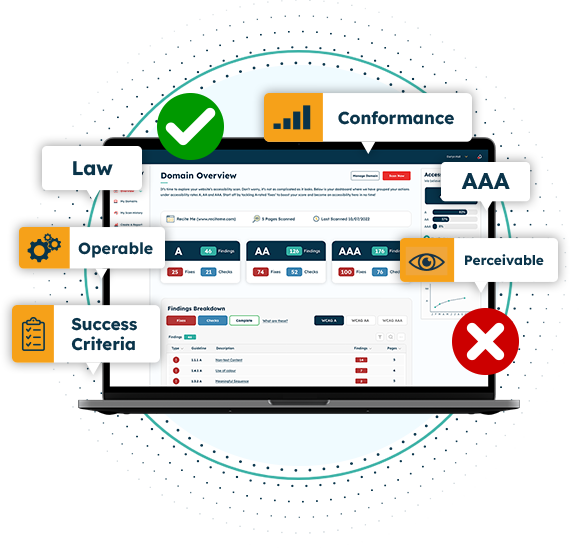

2. Enhance Usability for Individual Users
Empower individuals with diverse needs and preferences by integrating the Recite Me Toolbar into your website. This customizable tool allows users to adjust font size, color contrast, language settings, and more, ensuring a tailored browsing experiences that meet unique accessibility requirements.
Schedule a free demonstration, or try the toolbar today!
3. Communicate Your Commitment to Accessibility
Download a personalized accessibility statement using Recite Me’s Free Accessibility Statement Generator. This handy tool simplifies the process of outlining your website’s current compliance status and articulating future inclusion goals, fostering trust and confidence among disabled website visitors.

